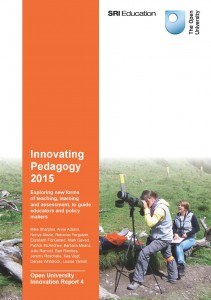The OU recently released their latest Innovation Report, Innovating Pedagogy 2015. This series of reports explores new forms of teaching, learning and assessment for an interactive world, to guide teachers and policy makers in productive innovation. This fourth report proposes ten innovations that are already in use but are yet to make a sustained impact on education. A brief overview of each is provided below, but we recommend taking a look at the report for a fuller exploration of how these approaches have the potential to shift educational practice in the years to come.
Crossover learning
Crossover learning experiences exploit the benefits of learning in both formal and informal settings by creating links between the educational content delivered in the classroom setting and real-world settings and experiences, for example, on placement, field trips, organisational visits etc. Such connections are two-way, and formal classroom learning can be enriched by knowledge and experiences acquired in everyday life.
Learning through argumentation
Borrowing from professional scientists and mathematicians, students can learn to argue in scientific ways; they can evaluate contrasting ideas, establish their own, and work with colleagues to refute claims, all of which can deepen their learning. Encouraging a classroom environment of open-ended questions, debate and the restatement of arguments can facilitate students’ development towards actively listening and responding constructively.
Incidental learning
Learning can occur in all manner of places and times. Incidental learning refers to unplanned or unintentional learning. It is unstructured by a curriculum and can occur in contexts not obviously related to what is being learned. Whilst it doesn’t lead to formal certification, it can encourage self-reflection, a deeper integration and coherence of ‘modular’ learning.
Context-based learning
This represents a shift away from the design of education in order to minimise the impact of context on learning and facilitate universal knowledge. Many professionals require context-specific application and acquisition of knowledge and universities are increasingly attempting to replicate this through authentic learning opportunities, where students are are, for example, immersed in the real-world context of the profession. Richer simulated experiences are also becoming more commonplace thanks to advancements in augmented and virtual reality and environmental modelling; students can replicate the real-world experience without the associated costs and risks.
Computational thinking
Computational thinking is the set of problem-solving skills acquired through learning the the principles and languages of computing. The steps of computational thinking – decomposition, pattern recognition, abstraction, algorithm design, debugging and solution presentation – are transferable to many disciplines where problem-solving procedures are central to success. Computational thinking is related to and can be developed by creating problem-based learning opportunities, where students are guided through pre-prepared problem-solving exercises in a time-bound, systematic way.
Learning by doing science with remote labs
Remote science labs provide opportunities for students to use authentic, specialised equipment in scientific experiments – building their inquiry skills and increasing motiviation and engagement. Remote labs usually include a piece(s) of equipment, robotic arms to operate it at a distance and cameras to provide a view of the experiment being undertaken. Such systems reduce barriers to participation and offer high-quality hands-on experiences to complement textbook learning.
Embodied learning
Embodied learning requires an awareness of how ones body is interacting with a real or simulated world to enhance learning. Mind and body are complementary in the learning process; physical action can reinforce what the mind is learning. This approach is most evident in the physical sciences with the use of Ttchnology such as wearable sensors and movement tracking cameras in the exploration of the friction, acceleration, force etc.
Adaptive teaching
Adaptive teaching and adaptive learning systems uses learner data to create a personalised path through educational content, in recognition of the fact that all learners are different and one set route through the same content can stifle a student’s progress. Such systems recommend the optimal place to start new content and when to review old content, and usually include monitoring tools to adjust the path whenever appropriate.
Analytics of emotions
Analytics of emotions includes automated approaches to analysing how students feel during the learning process – eye tracking, facial recognition etc. – and how they learn, in order to respond to the non-cognitive aspects of students’ learning such as whether one is frustrated, confused distracted etc. Combining computer-based techniques with human teacher expertise in responding to students’ dispositions creates a powerful opportunity to become responsive to the whole learner.
Stealth assessment
Stealth assessment borrows from the techniques used in online gaming to systematically collect data about users actions, decisions, strategies (for learning) in learning management systems, in order to proffer new challenges at appropriate times. Stealth assessment techniques, it is claimed, could test less quantifiable aspects of learning such as creativity, perseverance and strategic thinking. Research is ongoing in the area of learning analytics to determine what metrics are the best predictors of learning outcomes for different systems, and how to understand and manage the volume of data useful to individual tutors.
View the 2015 Innovating Pedagogy report
Please add your comments on the report and the innovations below...
Phil and Róisín


The section on incidental learning may me smile. Whoever wrote this must have swallowed the managerialism/process line if they think that it’s worth commenting on the fact we learn all the time, rather than just when people such as us plan learning for them in ways that can be measured.
Hi Rob, I guess the challenge lies in how we harness that incidental learning (if indeed we should)? What can we do to facilitate it? How do we put students in situations where it can take place? How do we enable students to see when it is taking place? Or to reflect upon it when it happens?
Or, do we just let it be? Are we in danger of trying to formalise the informal?
Phil